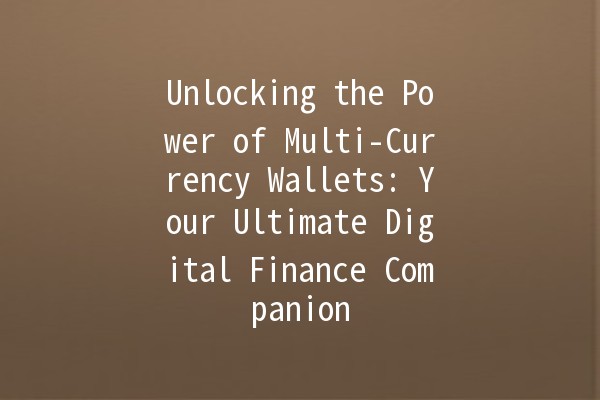
In the rapidly evolving world of cryptocurrencies and digital finance, multicurrency wallets have emerged as essential tools for both casual users and professional traders. These wallets not only facilitate secure storage and management of various cryptocurrencies but also offer functionalities that enhance user experience and engagement. In this article, we'll delve into the advantages and functionalities of multicurrency wallets while providing practical tips for maximizing their benefits.
Understanding MultiCurrency Wallets
A multicurrency wallet is a digital wallet that allows users to store and manage multiple cryptocurrencies in one place. Unlike traditional wallets that only support a single type of currency, multicurrency wallets enable seamless transactions across different cryptocurrencies, making them versatile tools for anyone involved in the digital currency ecosystem.

Why Choose a MultiCurrency Wallet?
Tips for Maximizing Your MultiCurrency Wallet Experience
Tip: Research the features and supported currencies of various wallets before making a decision. Look for wallets that match your trading habits and preferred cryptocurrencies.
Example: If you primarily use Bitcoin and Ethereum, ensure the wallet supports these cryptocurrencies as well as any other altcoins you may want to explore.
Tip: Always enable twofactor authentication (2FA) and use hardware wallets for added security when storing significant funds.
Example: Use an authentication app like Google Authenticator or Authy alongside your wallet for extra protection. Consider storing the majority of your assets in a hardware wallet while keeping only what you need for daily transactions in a software wallet.
Tip: Multicurrency wallets often provide realtime market data. Utilize this feature to stay informed about market fluctuations and make timely decisions.
Example: Set price alerts for your preferred cryptocurrencies to be notified of significant price movements, which can help you optimize your buy/sell strategies.
Tip: Many multicurrency wallets have integrated exchanges that allow you to swap cryptocurrencies within the wallet. Familiarize yourself with these features to save time and reduce fees.
Example: Suppose you hold Bitcoin and want to invest in Ethereum. Instead of withdrawing your Bitcoin to an exchange, you can directly swap it for Ethereum in your wallet, streamlining the process.
Tip: Always ensure your wallet is backed up. Most wallets provide recovery phrases; write them down securely.
Example: If you ever lose access to your wallet or it gets damaged, having a backup will allow you to recover your funds seamlessly.
Frequently Asked Questions About MultiCurrency Wallets
Multicurrency wallets offer substantial benefits, including convenience by combining multiple currencies into one wallet, cost efficiency by reducing transaction fees, enhanced security features, and ease of portfolio diversification. They are designed to simplify the management of various cryptocurrencies, making them an attractive option for both beginners and experienced investors alike.
When selecting a multicurrency wallet, consider factors such as the supported cryptocurrencies, security features (like 2FA and backup options), user interface, and customer support. Research user reviews and ratings on reputable platforms to find a wallet that best suits your usage patterns and security preferences.
Most modern multicurrency wallets are designed for crossdevice accessibility. However, this can vary depending on the wallet provider. Always check the wallet’s policies on access and security features before deciding to use it on multiple devices, ensuring that you maintain control over your assets.
While many multicurrency wallets include advanced security measures like endtoend encryption and twofactor authentication, the level of safety can vary based on the provider. Additionally, users play a crucial role by following best practices such as enabling 2FA and regularly updating passwords. Selecting a wellreviewed and reputable wallet provider is essential for maximizing security.
Transaction fees can vary depending on the cryptocurrency being sent or received and the wallet provider. Many wallets disclose their fee structures upfront, while some may absorb fees as part of their service. It's crucial to check the details before performing transactions to understand any costs involved.
If you forget your wallet password, look for a password recovery option within the wallet interface. Many wallets offer recovery solutions, often requiring you to utilize your backup recovery phrase. If the recovery is unsuccessful, you may lose access to your assets, underlining the importance of writing down your recovery phrase and securely storing it.
Multicurrency wallets are revolutionizing the way we manage and transact with cryptocurrencies. By providing a unified platform for diverse digital assets, they not only enhance convenience but also offer various tools to optimize your trading experience. Implementing the tips outlined above, such as thorough research, security measures, and leveraging wallet features, can significantly improve your handling of multicurrency wallets.
As you venture further into the world of digital currencies, embracing a multicurrency wallet will undoubtedly empower your financial journey, opening up new opportunities for investment and interaction in the expanding landscape of cryptocurrencies.

